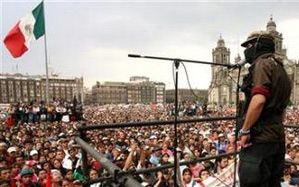 |
 |
 |
 News Around the Republic of Mexico | June 2006 News Around the Republic of Mexico | June 2006  
Mexico Forgets Zapatista Demands at Election
 Frank Jack Daniel - Reuters Frank Jack Daniel - Reuters


| | Mexican Zapatista rebel leader Subcomandante Marcos speaks during a rally in Mexico´s city main square May 1, 2006. On the election campaign trail for elections six years ago, Mexico's President Vicente Fox famously said he would resolve the Zapatista rebel Indian conflict in '15 minutes'. That never happened and now, as another presidential vote looms, ending a military and political deadlock in the southern state of Chiapas barely figures on the national agenda. (Daniel Aguilar/Reuters) |
Acteal, Mexico - On the election campaign trail for elections six years ago, Mexico's President Vicente Fox famously said he would resolve the Zapatista rebel Indian conflict in "15 minutes".

That never happened and now, as another presidential vote looms, ending a military and political deadlock in the southern state of Chiapas barely figures on the national agenda.

Tens of thousands of soldiers are still stationed near the rebel strongholds that dot the highlands and jungles of Chiapas, where on January 1, 1994, the Zapatistas briefly overran several towns to put an end to centuries of discrimination.

Before the fighting ended a few days later, 150 people were killed. Peace agreements were reached in 1996, but were never fully implemented -- leaving the rebels and their supporters angry and suspicious, although they stuck to a promise not to pick up their guns again.

"We were cheated then, and now we're not even talked about," said Agustin Vasquez, 39, a Tzotzil Indian who heads a group of villages sympathetic to the Zapatista cause, but which remain committed to non-violence.

Mexico's 13 million Indians tend to be the poorest people in the country, with high rates of illiteracy and malnutrition. That, and skewed land distribution in Chiapas, were major factors leading to the 1994 revolt.

Marcos, the Zapatistas' pipe-smoking, ski-masked leader and for years the Indians' loudest voice, left his jungle hideout in January this year on a national tour he calls "the other campaign." He says he wants an alliance between the indigenous movement and other groups considered excluded from mainstream Mexican politics but is not taking part in the election.

Some analysts say his shift to broader issues has allowed the Indians' fight for rights in Chiapas to drift even further off the political landscape.

"This is a very racist society," said author and political analyst Carlos Monsivais, "With the Zapatistas concentrating on their other campaign, indigenous demands have been abandoned."

Fox told Reuters in 1998 he would "smoke a peace pipe" with Marcos and said reaching an agreement with the rebels "should not take more than 15 minutes."

Despite the president's failure to make that a reality, few people believe the guerrillas will take up arms again.

But in the Chiapas hills, where Zapatista villages, painted with bright rebel murals, are closed to outsiders, many Indians feel let down and may not vote in the July 2 election.

POLITICS OF POVERTY

"They come and take photos with (us) and then say the poor support them," said Elena Vasquez, dressed in traditional purple and red embroidered clothing, in the village of Acteal, part of which is a rebel stronghold.

"It's just to manipulate the poor -- they never help us once they are in office," she said at a gathering of 500 mainly Tzotzil Indians in the non-rebel part of the village, where some 45 Catholic peasants were massacred in a chapel by right-wing paramilitaries in 1997 -- the worst single act of violence in the conflict.

Despite her mistrust of mainstream politicians, Vasquez said she may yet support leftist presidential candidate Andres Manuel Lopez Obrador, a leading contender.

The main demand of the rebels, and of the wider indigenous movement, is for self-determination -- including official recognition of Indian traditional authorities and control over natural resources on their lands.

Some observers believe there may be significant oil reserves under lowland areas of Chiapas.

In 2001, thousands of rebels and their supporters triumphantly marched to Mexico City, but found a promised legal reform to grant Indians more self-determination had been watered down in Congress. The Zapatistas have since refused to talk to the government, withdrawing to their villages to unilaterally implement the planned reform.

Felipe Arizmendi, bishop of the Indian-dominated San Cristobal de las Casas diocese, said there was no sign of any talks soon. "If there was a willingness to say, 'OK, the agreements were not totally met, but let's talk to see how we can move forward,'" there would be hope, he said.

"But right now there is no such possibility."

More government money has flowed into Chiapas since the uprising thrust the plight of the Indians into the national spotlight, bringing electricity, piped water and roads to isolated villages.

Ironically, autonomous Zapatista strongholds have least benefited from this spending as they reject government help.

Many villages sympathetic to the Zapatistas say most government money has been channeled to anti-rebel villages.

For Arizmendi, the main achievement of the uprising was to make the Indians aware of their rights and defend their culture and traditions, while reminding Mexico that they exist.

"If they don't pay more attention to the indigenous population the danger is that we lose the enormous richness in their cultures," he said, citing a surge in immigration to Mexican cities and the United States as a particular danger. | 
 | |
 |



